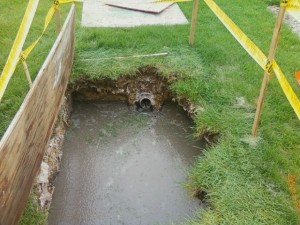
Septic systems are essential to rural living.
Communities have standards for their design, construction, and, increasingly, maintenance. Yet, even with those standards, septic systems can fail. When a septic system fails, the polluted water it releases can pose a human health risk, an expensive repair and a water quality problem for groundwater, streams and lakes.
Over the past three years, HRWC led a team of researchers and public health managers in pursuit of a new approach to detect failed septic systems that may reduce pollutants entering the Huron River in Michigan and yield a cost-effective approach for county health departments to monitor and rectify problem septic systems. Pollutants from failing septic systems — pathogens and phosphorus — play a role in the health of the Huron River and its tributary streams located in rural areas.
In fact, one of the more perplexing questions about water pollution in this river has been “how much of a problem are failing septics?”
The overall project goals were to 1) reduce the quantity of phosphorus and bacteria entering the middle Huron River, and 2) develop a cost?effective approach for monitoring and rectifying problems with septic systems for County Health Departments.



